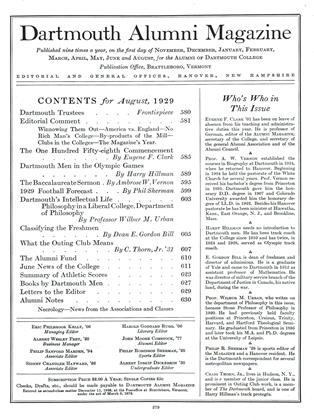So much for the brief history of the Greek Olympiads and it will not be amiss if the following quotation, usually found in the financial sections of our daily press is added: "The above statements, while not guaranteed, are taken from information which is believed to be reliable."
It was in 1892 that Baron Pierre de Coubertin of France first suggested the modern Olympic Games, and after many sessions of representatives from the interested nations, the first games of the modern Olympics were awarded to Greece. A wealthy Greek merchant of Alexandria, M. Averoff, caused the ancient Stadium to be restored and newly lined with Pentelic marble at his personal expense. A princely gift of a million drachmae and other lavish personal contributions and what amounted to a subsidy from the Greek Government completed the necessary fund, and the enterprise was brilliantly launched.
The succession of Olympic Games is well known: after Athens in 1896, Paris in 1900, St. Louis in 1904, London in 1908, Stockholm in 1912, Berlin (designated for 1916 and actually prepared but lapsed owing to the war). Antwerp in 1920, Paris again in 1924 and Amsterdam in 1928. Also in 1906 there was held an additional celebration in Athens, at the request of the Greek Government, and although officially the year was not an Olympic year, nevertheless the competition and interest was similar to the official games. Each meeting has been more amazing than its predecessor in the number of nations represented, in the number and quality of the competitors, in the number of sports clustered around the Olympic week of track and field events and in the social arrangements for better acquaintance among the competitors and officials.
For while track and field sports are the nucleus of the sport-plexus, they are not the whole of it. All kinds of out-door exercises and games have attached themselves to the Olympic week of track and field athletics, so that in this era it takes months to complete the program, and the gathering of athletes and their friends make for reciprocal good will and international peace; but in its largest aspect the idea makes for the general uplift and personal inspiration of untold millions.
 View Full Issue
View Full Issue
More From This Issue
-
 Class Notes
Class NotesCLASS OF 1879
August 1929 By Henry Melville -
 Article
ArticleAlumni Council Meetings
August 1929 -
 Article
ArticleThe One Hundred Fifty-Eighth Commencement
August 1929 By Eugene F. Clark -
 Class Notes
Class NotesCLASS OF 1899
August 1929 By Warren C. Kendall -
 Class Notes
Class NotesCLASS OF 1903
August 1929 By John Crowell -
 Class Notes
Class NotesCLASS OF 1918
August 1929 By Frederick W. Cassebeer
Harry Hillman
-
 Sports
SportsHOW THE OLYMPICS BEGAN
AUGUST 1929 By Harry Hillman -
 Sports
SportsTHE UNITED STATES IN THE GAMES
AUGUST 1929 By Harry Hillman -
 Sports
SportsTHE GAMES BEGIN
AUGUST 1929 By Harry Hillman -
 Sports
SportsA THRILLING MARATHON
AUGUST 1929 By Harry Hillman -
 Sports
SportsDARTMOUTH IN THE OLYMPICS
AUGUST 1929 By Harry Hillman -
 Sports
SportsVARSITY TRACK
January 1942 By Harry Hillman







